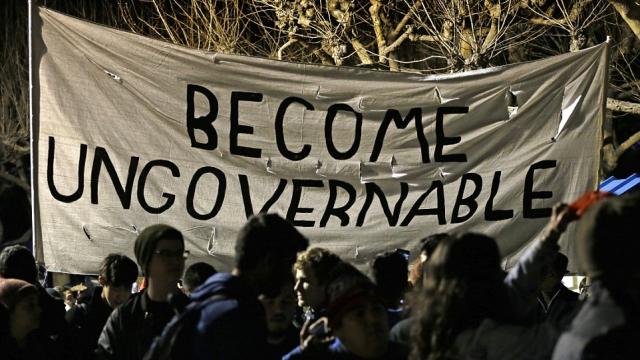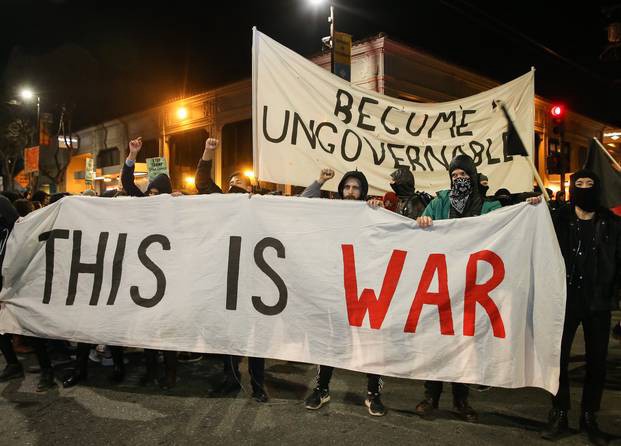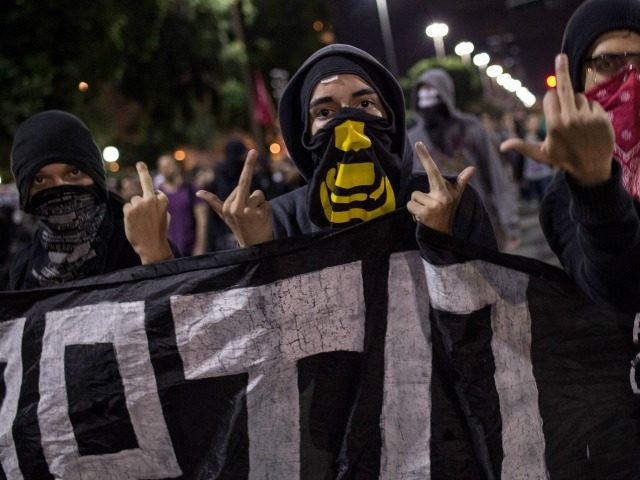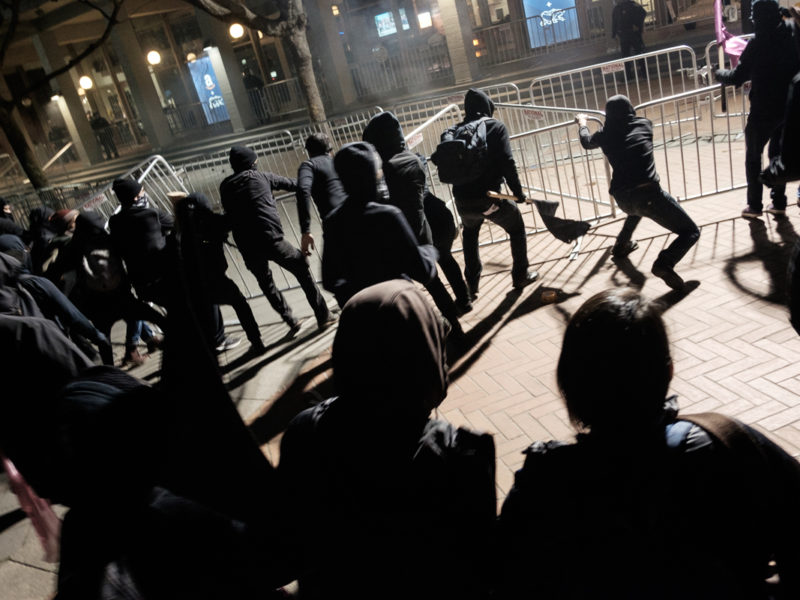
There is a common turn of phrase that seems to apply to nearly any instance when a term gets overused: “If everyone (or everything) is X, then no one (or nothing) is X.” The phrase gets invoked in political spheres where one group defines its enemies as “X,” then begins to see the existential threat of X everywhere, even if there is no such threat. If one declares s/he is on the side of right, fighting against the villainous other, then all who oppose, disagree with or simply fail to support that view become, by default, the very definition of the evil in question. In our immediate context: “If everyone is a Nazi, then no one is a Nazi.”
There is no shortage of examples to draw upon, whether we're looking simply upon our modern history or even if we reach back into some level of antiquity. It could be easy to invoke the imagery of a mob wielding pitchforks and torches, searching high and low for the “witch” who, but a few days prior to being declared one, was simply a neighbor. In today's case, a more modern sort of witch hunt is underway amid our increasingly polarized political landscape. For fairness and context, we should start the conversation in the mid-20th century.
Senator Joseph McCarthy, whose name is now forever associated with political witch hunts, lives on in infamy thanks to his ruthless paranoia about suspected Soviet spies living and working in the United States during the height of the Cold War. Famous for seeing the scourge of the “red menace” everywhere in public life, and holding public hearing after public hearing in an attempt to "root out the Commies," McCarthy led what effectively became show trials that destroyed many innocent lives. But the deep rooted fear and hatred of an ideological or philosophical adversary, and the actions that fear and hatred can provoke, is not limited to a singular political position. One need only look at the ways in which factions within left and right react when confronted with different ideas – each seeking their own version of political purity – to see it is still very much a human characteristic beyond political or philosophical boundaries.
For more serious examples of witch hunts, we can also turn to the world of religious fundamentalism, looking to the likes of Salman Rushdie as well as Danish and French cartoonists, all of whom came under genuine physical threat from Islamic extremists for nothing more than insult. In the case of the French cartoonists, as we know, this threat became a sad reality in the Charlie Hebdo massacre. But regardless of motivation, the herd mentality that feeds witch hunt enthusiasms can be seen in nearly any facet of life that forces a collective mindset.
From conservatives of the 20th century calling any and all liberals and progressives they met “commies” and “pinkos” for daring to suggest that public services were important assets to productive cultures, through the more modern claims that the U.S. is overrun with “Nazis,” the eagerness with which some write off those who may not see eye to eye with them – and thus treat them as a personification of political evil – is one of the most serious factors contributing to today's polarization and division. Often the divisions emerge as little more than name calling, but in times like these, when witch hunts appear to be carried out by those in power as well as by those seeking to affect profound societal change, some of the worst of our political natures can be seen on full display.
I recently got a taste of this witch hunt, the with-us-or-against-us mentality, when, after Occupy.com's publication of my article, "A Letter To The American Left," I found myself on the tail end of a substantial amount of hate and accusation. The anger ranged from claims that I, a former progressive organizer and the descendant of Jewish immigrants who sought to escape the rising tide of actual fascism and actual Nazism, am myself a Nazi or Nazi apologist, to indirect calls for violence. The apparent eagerness with which many Antifa activists or enthusiasts responded was often matched only by the raw malevolence of their message. Yet, beyond merely tossing around the words “Nazi” and “fascist” until they’ve lost all meaning, a deeper reality is exposed in the course of all of this.
The long and short of it has to do with two words: absolutism and orthodoxy. Much like the religious fundamentalist who looks purely and solely to their source of preferred “truth,” the political absolutists are likewise so mired in their singular, uncritical way of thinking that even the very notion that one is opposed to them can send them into fits of rage, simply because a person failed to adopt their perspective wholeheartedly. Whether or not this speaks to the underlying insecurity of their own positions, their rage often creates, in the eyes of the absolutist, the appearance of enemies who not only disagree with them, but who are in fact their sworn enemies and, by extension, a very part of the “evil” they seek to fight.
This is, of course, as helpful to a given cause as it is reflective of actual reality; that is to say, generally not helpful in the slightest. Just as I, a Jewish former labor organizer and progressive activist, am not actually the Nazi I have recently been accused of being, so the labeling of all opponents to, or critics of, one’s specific ideology as right wing, Nazi, fascist, racist, sexist, misogynist, transphobe, Islamophobe, etc, ultimately does little to help one’s cause. It is, rather, nothing short of a thought-terminating statement designed to shut down discussion and insist on unquestioned conformity. Not only does the slander serve little to fundamentally understand or break down the thought processes which the opposition holds – an essential part in actually winning any "war of ideas" whatsoever – but it signifies to the general public who often stand quietly by observing such exchanges that those engaging in the reactionary labeling are not worth listening to.
Couple this with the sound byte culture we inhabit, and from a practical standpoint the shrieking demands for absolute thought conformity have, whether genuinely or through perception alone, become associated intrinsically with the American left and its opposition to the growing rightwing populism we see presently. At the same time, the common joking refrain of those who may be critical of hardline factions from the right – or more importantly, the center – that “they eat each other,” becomes well warranted with radicals constantly policing the thoughts and language of their peers while often turning a blind eye to the genuinely bad actions taken by, say, Antifa and the black bloc factions.
In this, as with most matters of political activism and issue advocacy, the radicals’ eagerness to fly a banner and espouse their positions seems to take precedence over considerations as to what actually works. Though it is said countless times by respected and intelligent voices, not all those who voted for Trump, who voted for Brexit or who vote for right wing conservatives and call themselves “reformers” are in fact hateful racists. Not all who oppose Antifa are Nazis. Not all who criticize the “resistance” are its adversaries.
But so long as division and derision take precedence over unity and reason, it may be fair to say that regardless of the legitimacy of the protests to come, increasing numbers of the real body politic, who often make their judgments silently while awaiting their chance to actually vote, will fall further away from progressive liberal politics, preferring the side which, if nothing else, did not go out of its way to dramatically insist that they were the ones who were hateful.
3 WAYS TO SHOW YOUR SUPPORT
- Log in to post comments
















